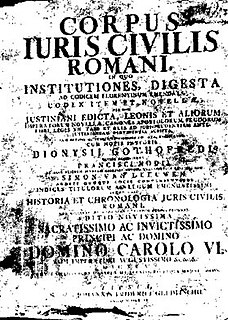
The Corpus JurisCivilis is the modern name for a collection of fundamental works in jurisprudence, issued from 529 to 534 by order of Justinian I, Byzantine Emperor. It is also sometimes referred to metonymically after one of its parts, the Code of Justinian.

The judiciary is the system of courts that adjudicates legal disputes/disagreements and interprets, defends, and applies the law in legal cases.

The University of Bologna is a research university in Bologna, Italy. Founded in 1088 by an organised guild of students (studiorum), it is the oldest university in continuous operation in the world, and the first university as a higher-learning and degree-awarding institute. At its foundation, the word universitas was first coined.
A law degree is an academic degree conferred for studies in law. Such degrees are generally preparation for legal careers. But while their curricula may be reviewed by legal authority, they do not confer a license themselves. A legal license is granted by examination, and exercised locally. The law degree can have local, international, and world-wide aspects, such as in England and Wales, where the Legal Practice Course or passing Solicitors Qualifying Examination (SQE) is required to become a solicitor or the Bar Professional Training Course (BPTC) to become a barrister.

Civil law is a legal system originating in mainland Europe and adopted in much of the world. The civil law system is intellectualized within the framework of Roman law, and with core principles codified into a referable system, which serves as the primary source of law. The civil law system is often contrasted with the common law system, which originated in medieval England, whose intellectual framework historically came from uncodified judge-made case law, and gives precedential authority to prior court decisions.
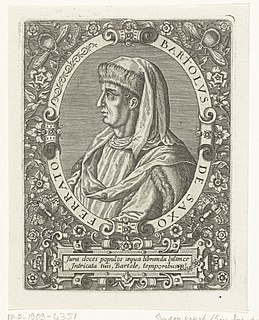
Bartolus de Saxoferrato was an Italian law professor and one of the most prominent continental jurists of Medieval Roman Law. He belonged to the school known as the commentators or postglossators. The admiration of later generations of civil lawyers is shown by the adage nemo bonus íurista nisi bartolista — no one is a good jurist unless he is a Bartolist.
The scholars of the 11th- and 12th-century legal schools in Italy, France and Germany are identified as glossators in a specific sense. They studied Roman law based on the Digesta, the Codex of Justinian, the Authenticum, and his law manual, the Institutiones Iustiniani, compiled together in the Corpus Iuris Civilis. Their work transformed the inherited ancient texts into a living tradition of medieval Roman law.
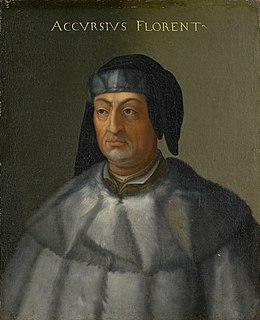
Accursius was a Roman jurist. He is notable for his organization of the glosses, the medieval comments on Justinian's codification of Roman law, the Corpus Juris Civilis. He was not proficient in the classics, but he was called "the Idol of the Jurisconsults".

Irnerius, sometimes referred to as lucerna juris, was an Italian jurist, and founder of the School of Glossators and thus of the tradition of Medieval Roman Law.
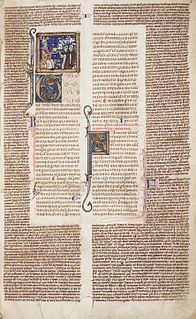
Azo of Bologna or Azzo or Azolenus was an influential Italian jurist and a member of the school of the so-called glossators. Born circa 1150 in Bologna, Azo studied under Joannes Bassianus and became professor of civil law at Bologna. He is sometimes known as Azo Soldanus, from his father's surname, and also Azzo Porcius, to distinguish him from later famous Italians named Azzo. He died circa 1230.
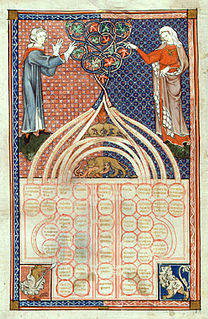
The Decretum Gratiani, also known as the Concordia discordantium canonum or Concordantia discordantium canonum or simply as the Decretum, is a collection of canon law compiled and written in the 12th century as a legal textbook by the jurist known as Gratian. It forms the first part of the collection of six legal texts, which together became known as the Corpus Juris Canonici. It was used as the main source of law by canonists of the Roman Catholic Church until the Decretals, promulgated by Pope Gregory IX in 1234, obtained legal force, after which it was the cornerstone of the Corpus Juris Canonici, in force until 1917.
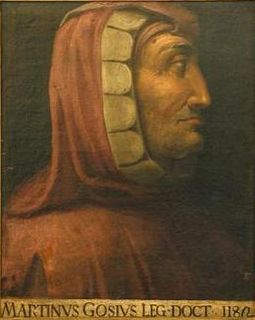
Martinus Gosia was one of the glossators and a 12th-century Italian jurist, counted among the Four Doctors of Bologna, the others being Bulgarus, Hugo de Porta Ravennate and Jacobus de Boragine.

Bulgarus was a twelfth-century Italian jurist, born in Bologna. He has been confused with Bulgarinus, a 15th-century jurist.
Roman-Dutch law is an uncodified, scholarship-driven, and judge-made legal system based on Roman law as applied in the Netherlands in the 17th and 18th centuries. As such, it is a variety of the European continental civil law or ius commune. While Roman-Dutch law was superseded by Napoleonic codal law in the Netherlands proper as early as the beginning of the 19th century, the legal practices and principles of the Roman-Dutch system are still applied actively and passively by the courts in countries that were part of the Dutch colonial empire, or countries which are influenced by former Dutch colonies: Guyana, South Africa, Sri Lanka, Indonesia, Suriname, and the formerly Indonesian-occupied East Timor. It also heavily influenced Scots law. It also had some minor impact on the laws of the American state of New York, especially in introducing the office of Prosecutor (schout-fiscaal).
Dominium mundi is an idea of universal dominion developed in the Middle Ages. Inspired by the memory of the Roman Empire, dominium mundi implied the recognition of one supreme authority, which generated a prolonged political and spiritual struggle between imperial and ecclesiastical power. This struggle can be said to have begun with the Investiture Controversy, and was mainly embodied by the Holy Roman Empire and Catholic Church, which elevated the emperor and Pope, respectively, to the status of supreme ruler. The idea of universal dominion divided Italy into the warring faction of Guelphs and Ghibellines. Guelphs supported the Church, while the Ghibellines supported the Empire. After two hundred years of division during the 12th and 13th centuries, neither one of the powers had prevailed, due to their mutual dependency and the rise of the powerful and practically independent reigns of Church and the State. The idea of dominium mundi did not reappear in its original form, despite the fact that both universal powers subsisted.
International law, is the set of rules, norms, and standards generally recognized as binding between states. It establishes normative guidelines and a common conceptual framework for states across a broad range of domains, including war, diplomacy, economic relations, and human rights. Scholars distinguish between international legal institutions on the basis of their obligations, precision, and delegation.
The postglossators or commentators formed a European legal school which arose in Italy and France in the fourteenth century. They form the highest point of development of medieval Roman law.
Medieval Roman law is the continuation and development of ancient Roman law that developed in the European Late Middle Ages. Based on the ancient text of Roman law, Corpus iuris civilis, it added many new concepts, and formed the basis of the later civil law systems that prevail in the vast majority of countries.

Jacobus de Boragine was one of the Glossators, and Four Doctors of Bologna. Also known as Jacobus, he was born in the early 12th century and was an Italian lawyer, one of four students of Irnerius called the Quattuor Doctores, although Savigny disputes the general tradition of his inclusion in this list. The other doctors were Bulgarus, Martinus and Hugo. The legal philosophy of Bulgarus adhered closely to the letter of the law while their fellow, Martinus, took a more natural law and Equity approach. His time at Bologna was therefore one of the formative times in legal theory.
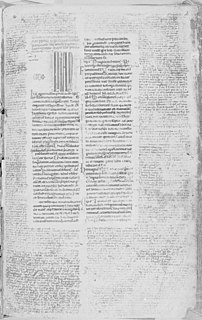
Hugo de Porta Ravennate was an Italian jurist, and member of the Glossators of Bologna. He came from a noble family who had residence in the city of Bologna, but whose family name meant "the gate of Ravenna".











